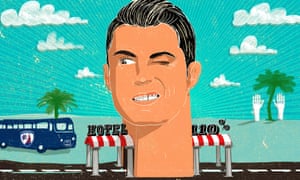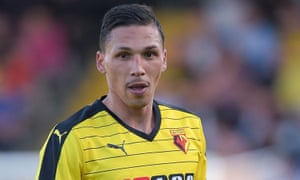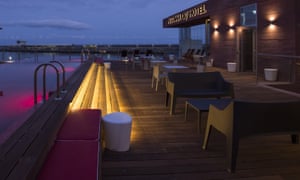Awhile ago Watford’s German-born Greek left-back José Holebas went into a tattoo studio, raised his fists and asked for the words “Don’t hate, care love” to be tattooed across his fingers. It is not easy to create a message of optimism and unity in a foreign language using no punctuation and while restricted to words that are four letters long – perhaps replacing “care” with “only”, “just” or even “make” would have been slightly better – but this was not a disastrous attempt.
The problem was that, despite being heavily tattooed across his torso, Holebas was not prepared for the pain involved in inking his fingers. For a while he suffered in silence but with the job only halfway through he decided he could bear no more, told the artist to lay down his needle and departed. And so it is that Holebas’s hands now carry the considerably less inspiring legend “don’t care”.
In sport, both on the field and off it, abandoning an enterprise when it remains incomplete can often prove embarrassing, as Chesterfield discovered to their very great humiliation this week, when they were profoundly ruffled by a half-run raffle. The club had offered as a competition prize a five-day trip with the team on their pre-season tour of Hungary, including lunch with the players and dinner with the manager (there were no breakfast-based pledges), only for so few people to buy the £20 tickets it was decided to quietly abandon the contest and award the prize to the entirely fictional “Surrey-based Spireite James Higgins”.
When real-life supporters in Hungary found no sign of Higgins, the club released a statement saying “illness prevented him from travelling” and that though he was “naturally very disappointed” he would instead be “treated to hospitality” at a future game. Finally they gave up on the pretence, sacked their marketing manager and apologised “unreservedly to the four fans who entered the competition”.
It is more than simply cliche that in sport it is best never to do things by halves. Success demands total commitment, the infamous 110%. “I always try to improve,” Cristiano Ronaldo once said, summing up the ideal attitude. “Tomorrow I will be better than today and next year will be better than this one. To be the best you can be, you have to be focused.”
What is true of footballers is also true of hoteliers, as Ronaldo should know, being both. Plenty of leading sportsmen have dabbled with hotels, largely seeing it either as a mildly diverting mid-career sideline or a method of funding a retirement of rural golfing bliss but Ronaldo has approached his with a familiar sense of complete self-obsession.
When Andy Murray bought Cromlix House, the hotel near his childhood home in Dunblane which he reopened in 2014, he announced it would “attract new visitors to the area, create a number of jobs and focus on supporting other local businesses”; when Ronaldo revealed his move into the industry, he said: “I’ve always dreamed of having my own hotel. I’m sure this investment will be one of the best things I could do for my future.” His is a world like, and with, no other.
This is not a man who leaves dreams unrealised. “I always dreamed of becoming a father when I was 25,” he said, after becoming a father when he was 25. “I always dreamed of playing for Real Madrid,” he said, after signing for Real Madrid. “I’ve always dreamed of winning the Champions League with this club,” he said, shortly before winning the Champions League with that club. “Creating my own fragrance is something that I have always dreamed of doing,” he said, after creating his own fragrance. “I have always dreamed of winning for Portugal,” he said, after winning for Portugal, adding: “Dreaming is free, so let’s keep dreaming.”
Dreaming is not free when it happens in the CR7 hotel, which opened in Madeira a few weeks ago. According to the publicity material it is “powerful, exciting and unique”, offers “a sophisticated, smart casual feeling and the ultimate digital technology” and allows you to “open the doors to your room and to CR7’s lifestyle, like a true digital pioneer”. There are transparent saunas, in-room yoga mats and access to “Cristiano Ronaldo’s personalised training program”, as well as to the CR7 Museum, just around the corner. Residents are expected to end their day “with a glass of champagne and an unbelievably winning feeling”.
When launching his fragrance last September, Ronaldo said that “it’s important to me to give something that is 100% myself. It’s about creating a lasting impression and something that people remember you for.” Better swish hotels and fancy underpants than, say, knowing winks to his bench after helping to get Wayne Rooney sent off, an incident that defined him in Britain for some time after the 2006 World Cup and which he appears not to have entirely forgotten.
The CR7 hotel website features a gallery of photographs, to give the potential visitor an idea of what they may see when they arrive in Funchal. It appears that inside the £575-a-night suite there is a coffee table, on which there is a magazine. The magazine is called Wink. And so it is that the last thing a guest will be reminded of before grabbing 40 of his own, is one of the owner’s. And there is little doubt which of the two is going to end the transaction once again enjoying a – hard-fought, no-half-measures, 100% committed – unbelievably winning feeling.



EmoticonEmoticon